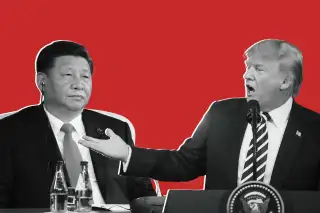Trump's Trade War with China Just Got Bigger. Here's What That Means for Your Investments

President Trump's trade war is heating up again. Your investment portfolio could get caught in the middle.
On Monday, President Trump announced a new round of tariffs targeting $200 billion of Chinese import goods, the latest move in his ongoing battle to redress what he claims is a one-sided trade relationship between the U.S. and the world's second largest economy.
So far, investors have shrugged off trade worries, with the the S&P 500 rising 4.4% in the past three months. But companies are warning investors that they don’t know the full impact. According to FactSet, 51% of the 70 companies that had mentioned the word “tariff” during second quarter earnings calls this summer were worried about negative repercussions or expressed uncertainty.
For your portfolio, though, you’re already likely feeling some shockwaves.
International Investments Struggle
The greatest initial impact may have come in your international holdings. The MSCI World-ex U.S. Index, a broad benchmark of non-U.S. stocks, has fallen 5%. It gets worse when honing in on specific markets. The iShares China Large Cap exchange-traded fund is down 9%.
This shouldn’t scare you away. Remember, diversifying into other countries will protect you if the U.S. market struggles. That’s not what many investors have done. Since 2009, Fidelity Investments found that the average exposure to international stocks for those under 35 has dropped from 21% to 13% today.
If you’re looking to re-balance your portfolio, then you’ll find that international stocks are cheap, trading at 15 times their average annual profits over the past 10 years, compared to 32 times for U.S. firms.
If Companies Can’t Raise Prices They’re In A Tough Position
In the U.S., companies hit the hardest could be the ones with already flagging sales.
In theory, import duties are taxes, boosting retail prices consumers pay on targeted goods. In reality there's always a tug-of-war as companies try to pass the full amount of the tax, without letting the higher prices drive away potential customers. When sales are already soft, corporate executives may find a price hike is too risky. In that case, the taxes eat into corporate profits.
Something like that has been happening to motorcycle giant Harley-Davidson, whose second-quarter sales were down about 11%. The company's chief executive recently told investors the trade war could cost Harley $45 million to $55 million this year. Harlery's stock is down about 15% in 2018.
Overall, the consumer discretionary sector has done well in the past year -- no surprise given the strong economy -- returning nearly 30%, compared to about 16% for the broad market. However, returns have lagged slightly over the past three months, as trade rhetoric has heated up. Consumer discretionary stocks have gained about 4.2%, compared to 4.4% for the market as a whole.
Steel Companies Power Forward
The unofficial winner of the war, thus far, has been the steel industry. Since one of the more onerous tariffs came in the form of a 25% tax on imported steel, it has led to a clamoring towards U.S. products. Domestic steel prices have jumped more than 30% in this year. Nucor, a steel company out of Charlotte, N.C., saw its profits double during the second quarter, for example.
So there’s a sliver of good news, in this wasteland. But it's only a sliver. The five largest U.S. steel companies have a total market value of about $41 billion. That compares to the $30-trillion-plus value of the total U.S. market.